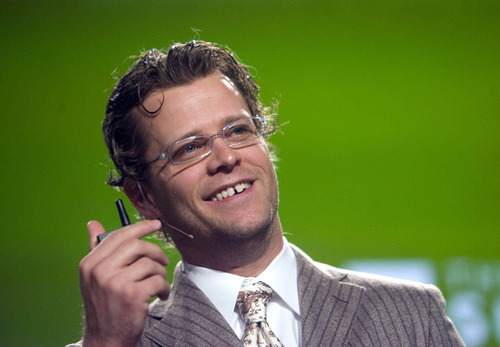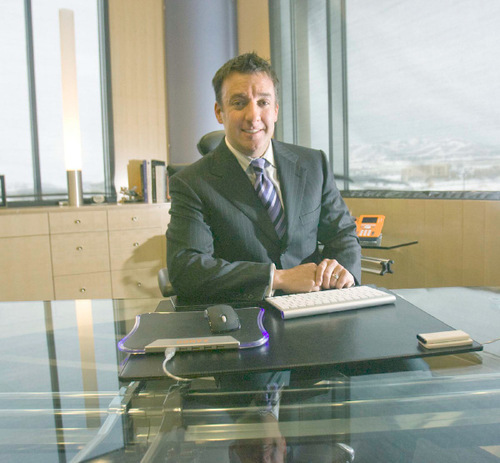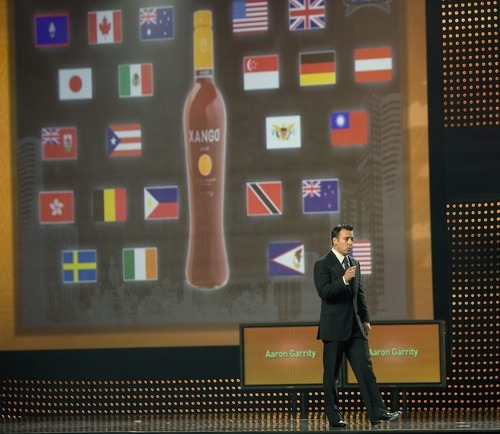This is an archived article that was published on sltrib.com in 2011, and information in the article may be outdated. It is provided only for personal research purposes and may not be reprinted.
MonaVie CEO Dallin Larsen took the stage in Orlando, Fla., last month and got to work.
He extolled riches to be earned. He shed tears over a little girl's cancer. He evangelized about his company's exotic fruit juice.
MonaVie, Larsen said, is building toward $20 billion in annual sales of its products based on a berry from the Amazon jungle.
His audience of independent distributors responded with episodes of wild cheers.
Attending conferences such as the Orlando event in January and one coming in June in Salt Lake City is like "going to church, going to temple," Larsen said. He exhorted the distributors to put in 10,000 hours building their own independent businesses by recruiting others into their networks, saying, "No longer can you make an excuse. It's up to you."
"We're locked and loaded," he told the crowd. "We're ready for the next 100 millionaires."
To outsiders, events such as this have all the feel of a cult, the true believers cheering as men and women dangle promises of wealth, spiritual well-being, personal health, family togetherness and happiness through the medium of fruit juice.
Cultish though it may seem, the marketing of nutritional products through networks of independent distributors is big business, and perhaps nowhere more so than in Utah, notwithstanding fervent criticism of some of its practices.
"This is the hub of direct selling in America," said Aaron Garrity, CEO of XanGo, the colorful Lehi company that, like MonaVie, sells a juice through a multilevel marketing plan, also known as direct selling or network marketing.
—
Sons of the profits • Utah has at least nine major multilevel marketing (MLM) companies selling nutritional and body-care products that have more than $100 million in annual sales, according to Direct Selling News, a trade publication. The annual revenue of those nine add up to at least $4.49 billion, but Utah also has a number of smaller companies that are part of its nutritional supplements industry, which in total are a key component of the state's economy.
The industry as a whole sees about $6.2 billion to $6.5 billion in annual sales, according to Loren Israelsen, executive director of the United Natural Products Alliance, a national industry trade group based in Salt Lake City. But he said the economic impact to the state is much broader if you include all of the providers of products and services, plus events such as the companies' annual conventions.
"If you really throw everything in and just ballpark it for the economic impact on the state, I think it gets pretty close to $10 billion," Israelsen said. "As best we can tell, behind tourism we're the biggest industry."
It's the juice segment, though, that attracts the most attention lately, with flashy marketing and legions of independent distributors who earn commissions by recruiting others into their networks.
Critics say multilevel marketing and the companies' controversial products by their very nature raise troubling questions. Are they creating a voodoo economy built on a veneer of science that makes spurious claims about the health benefits of fruit juices and about the riches that supposedly can be earned by distributors?
"Not only does it hurt our reputation as a state, it continues to perpetuate the problem because the younger generation sees too many people who make a quick buck from what turns out to be houses of cards," said Josh James, the co-founder and former CEO of Omniture, one of the state's most successful technology companies.
"The perception of get-rich-quick hurts their careers, prevents some people from being willing to put in a hard day of work to develop experience, and in many cases dramatically alters a family's financial condition negatively."
—
The lure of 'healthful living' • In mid-2010, Utah's pharmaceutical and medicine manufacturing industry encompassed 4,737 jobs and 79 businesses. That economic statistical area is a "fairly accurate proxy" for the nutritional supplements industry, according to the Utah Department of Workforce Services.
Israelsen said the industry employs about 15,000 people in 150 to 160 companies when related businesses and services are included.
He traces the start of the industry in Utah to John Christopher of Springville, who wrote and lectured on the healing properties of herbs in the mid-20th century. His specific ideas about healthy diets fit nicely with the Mormon Word of Wisdom, which promotes the use of herbs in healthful living.
Christopher extolled "a style of healthful living that was quite resonant with Mormon culture," Israelsen said.
The Utah nutritional industry got going in the late 1950s and early '60s with four companies — Nature's Way of Springville; Nature's Sunshine Products in Spanish Fork; Nature's Herbs, which is now part of IdeaSphere of American Fork; and Solaray, which is now part of Nutraceutical Corp. of Park City.
Those four started with what Israelsen calls the "classic story," a family member with an illness who finds an herb or other natural product that helps alleviate the condition and then goes on to create a product to help others.
Nature's Sunshine Products was Utah's first MLM, following in the steps of Amway, the New York company that started in 1959.
MLMs recruit networks of independent distributors, sometimes called networkers, to buy their products. Distributors are told they are independent business operators who can build their enterprises by recruiting other distributors who are placed in their downlines, with commissions from sales to distributors moving up through various levels.
From a business standpoint, the use of multilevel marketing instead of selling products through established retail outlets has certain advantages. Start-up costs are low and marketing expenses minimal.
"We chose network marketing rather than a traditional way because there was a story to be told and that story needed more than a 30-second spot," said John Wadsworth, co-founder and president of Tahitian Noni, the first MLM with a nutritional juice product. He also said that in founding the company in 1996, he and partners went the MLM route because they ran out of money.
The growth of such companies in Utah also came from two other factors, emulation of a successful enterprise and the presence of former LDS missionaries, said Clint McKinlay, a former executive turned distributorwho is now an industry consultant.
"One answer to why Utah is simply Nu Skin," he said, referring to one of the oldest and most successful companies. "They were big, they were successful and a lot people work there."
Network marketing companies also do well in other countries, creating a need for foreign language speakers, and Utah has a concentration of former missionaries sent around the world by The Church of Jesus Christ of Latter-day Saints, which has its headquarters in Salt Lake City.
Plus, McKinlay said, MLM companies rely on intricate charts of distributors related through downlines, a task Mormons understand because of the faith's emphasis on charting ancestors through genealogy and creating communities of believers.
—
A cutthroat industry • Tahitian Noni invented the nutritional "super fruit" juice drink and had the first wild success that spawned a number of imitators.
Wadsworth said while working as a scientist for other food companies, he discovered possible medicinal properties in the noni fruit from Tahiti, and that he and others created the product and the company.
The MLM was highly successful. One employee was Garrity, who left to help form XanGo, whose juice is based on the mangosteen fruit from Southeast Asia.
Morinda, Tahitian Noni's parent company, sued Garrity and the other five XanGo founders in 2003, claiming they stole the concept for a juice based on mangosteen. The case was settled out of court in 2006 and its contents sealed.
XanGo, with its name, flashy logos, use of technology and hip marketing, brought multilevel marketing some respectability, McKinlay said.
"They made network marketing cool."
Larsen, a former vice president at Usana Health Sciences, one of the state's top MLMs, launched MonaVie in 2005 along with other co-founders, their juice based on the açai berry found in the Amazon jungle of Brazil. The company claims $2 billion in sales since its launch, though it is privately held and the number can't be verified.
What's clear from court records, though, is that MonaVie was built by using million-dollar payments to woo top distributors away from other companies, including Tahitian Noni, XanGo and Amway. The practice has spawned lawsuits against MonaVie and distributors who have left other companies.
"MonaVie does have a reputation out there that they've tried to build their business by trying to steal downlines from other businesses," said Andre Peterson, Tahitian Noni director of public relations.
In an interview last year, Larsen defended the company's practices.
"I believe when a distributor believes his or hers dreams and goals are going to be better served going to this company or that company they ought to have a right," he said.
While not naming other companies, Tahitian Noni's Wadsworth also complained that those who entered the business after his company have done so not on the quality of their products.
"They are very good at marketing, they just don't have the science we have," he said.
For his part, Garrity, a recognized marketing innovator in the industry, said in an interview last year the industry had become moribund by the time he helped found XanGo.
"I found in the industry the companies would actually spend more on the actual contents of the products and pay less attention to the brand," he said.
—
Outsized profits • Garrity and others in the business have made themselves quite wealthy.
Court documents in a lawsuit by several original investors showed that for tax purposes in 2006 alone, Garrity's share of XanGo's profits was $6.3 million, with the company showing taxable income of $36.7 million.
Although MonaVie won't disclose its profits, co-founder Henry Marsh, a former Olympic steeplechase runner, said they are similar throughout the industry with those of publicly traded companies that must report their financial data to the Securities and Exchange Commission. Nu Skin said in its annual report for 2010 it had $1.5 billion in revenue and a net income of $136 million. Usana Health Sciences reported $436 million in sales revenue in 2009, with $33.5 million in net income.
If MonaVie had $2 billion in sales since its founding, then, according to those industry numbers, its profits might be somewhere around $160 million.
—
A healthy skepticism • Whatever the numbers, the MLM juice industry is controversial among critics and skeptics because:
• Distributors provide almost all the revenue to the companies, not retail sales from consumers.
• The companies hold out images of riches to be had if the distributors work hard and build their own businesses. But only a tiny fraction make millions and more than 90 percent in some companies make little or no return on their investments in products, time, training materials and other expenditures needed to recruit downlines. Average turnover is 56 percent annually, according to the Direct Selling Association.
• The companies clothe their products in the veneer of science, citing studies that show their ingredients or juices have qualities that make them potent health-promoting foods. Yet their health benefits remain largely unproven. There is no way to definitively judge whether one product is more authentic than another, let alone more effective, food scientists and nutritionists say.
• The products are expensive — $30 or more wholesale for less than a quart of their fruit juice — that may not in some cases be better for you than fruit juice from a retail outlet at a fraction of the price.
—
Good for Utah? • All of that has led some in Utah to question whether the state is well served by having such a concentration of high-profile MLMs.
To measure the social worth of an enterprise, Greg Warnock, a co-founder of Mercato Partners, points to "value engineering," in which a product or service meets a need or solves an important problem. His company provides capital primarily in the technology sector.
"Some companies generate short-term profits through sales tactics and complex and recursive incentive plans," Warnock said in an e-mail. "Utahns should be concerned about businesses that use extraordinarily high-pressure sales strategies, that approach those less able to protect themselves from aggressive or manipulative 'get rich quick' sales conversations in the home."
Although James, the Omniture co-founder, pointed to companies such as Nu Skin that he believes sell legitimate products, he added: "Selling a product that doesn't deliver or that has too much hand waving by paid PhDs and MDs purporting to have some previously undiscovered beneficial effects isn't right. Making money off of signing up people for MLM companies that don't have any real products to sell or that make big commissions off of forced product purchases, even though there is a low historical success rate of reselling those back into the market, is not right."
—
A growing 'juice fatigue' • According to industry insiders, juice MLM revenue has fallen — quite sharply in some cases — from its tremendous highs a few years ago. MonaVie reported $855 million in revenue in 2008, which landed it third in total revenue on Inc. magazine's list of 500 of the nation's fastest-growing private companies. It did not make the 2010 list.
Devin Thorpe, chief financial officer, said the company started to grow again in the second half of 2010 but that it would not disclose its 2009 or 2010 revenues.
McKinlay, the consultant, said there's a bit of "juice fatigue" in the marketplace because of the proliferation of those companies and their products, a notion MonaVie President Dell Brown pooh-poohed as "akin to a top cola company worrying about 'soda pop fatigue.' ''
XanGo said that although it had not been immune to the effects of the recession, its international business was offsetting a slow domestic market and that it remained "strong and profitable." The number of its distributors was expanding and it had signed "several big names in network marketing" without using signing bonuses, the company said.
The companies and their officers remain true believers, in themselves and their products.
In Orlando last month, Larsen closed the meeting by urging the distributors to buy their tickets for the MonaVie convention in June in Salt Lake City.
"Three to five years from now, there's not a person in this room who can't have worldwide MonaVie business," he said.
—
—
The big nine: Utah's top multilevel marketing companies
Multilevel marketing companies in Utah that have at least $100 million in revenue in 2009 are:
Nu Skin Enterprises Inc.
Annual revenue • $1.5 billion
Distributors • More than 794,000
Employees • 3,400
Headquarters • Provo
MonaVie LLC
Annual revenue • $785 million
Distributors • 1 million
Employees • 80 (2010)
Headquarters • South Jordan
Tahitian Noni International Inc.
Annual revenue • $450 million
Distributors • 500,000
Employees • 1,200
Headquarters • Provo
Usana Health Sciences
Annual revenue • $437 million
Distributors • 198,000
Employees • 930
Headquarters •West Valley City
Neways Inc.
Annual Revenue • $400 million
Distributors • 500,000
Employees • 1,000
Headquarters • Springville
Nature's Sunshine
Annual Revenue • $343 million
Distributors • 697,000
Employees • 1,191
Headquarters • Provo
XanGo LLC
Annual Revenue • $250 million
Distributors • 1.4 million
Employees • 450
Headquarters • Lehi
Figures are for 2009
Agel Enterprises LLC
Annual Revenue • $175 million
Distributors • 554,000
Employees • 250
Headquarters • Lehi
4Life Research
Annual Revenue • $150 million
Distributors • Not available
Employees • 300
Headquarters •Sandy
—
Source: Direct Selling News, SEC reports —
The big nine: Utah's top multilevel marketing companies
Multilevel marketing companies in Utah that had at least $100 million in revenue in 2009 were:
Nu Skin Enterprises Inc.
Annual revenue • $1.5 billion
Distributors • More than 794,000
Employees • 3,400
Headquarters • Provo
MonaVie LLC
Annual revenue • $785 million
Distributors • 1 million
Employees • 80 (2010)
Headquarters • South Jordan
Tahitian Noni International Inc.
Annual revenue • $450 million
Distributors • 500,000
Employees • 1,200
Headquarters • Provo
Usana Health Sciences
Annual revenue • $437 million
Distributors • 198,000
Employees • 930
Headquarters •West Valley City
Neways Inc.
Annual Revenue • $400 million
Distributors • 500,000
Employees • 1,000
Headquarters • Springville
Nature's Sunshine
Annual Revenue • $343 million
Distributors • 697,000
Employees • 1,191
Headquarters • Provo
XanGo LLC
Annual Revenue • $250 million
Distributors • 1.4 million
Employees • 450
Headquarters • Lehi
Figures are for 2009
Agel Enterprises LLC
Annual Revenue • $175 million
Distributors • 554,000
Employees • 250
Headquarters • Lehi
4Life Research
Annual Revenue • $150 million
Distributors • Not available
Employees • 300
Headquarters •Sandy
—
Source: Direct Selling News, SEC reports









